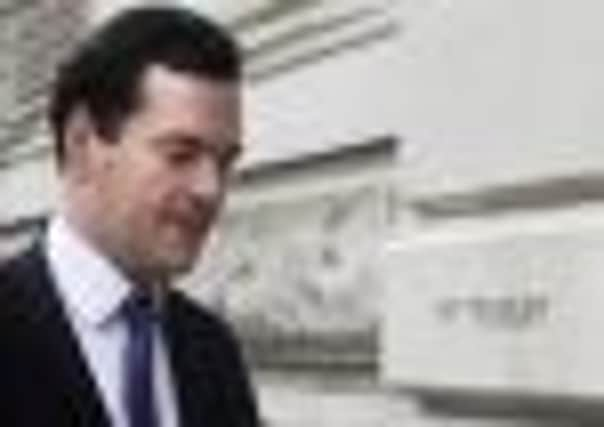Austerity cuts under attack after economic growth stalls


The accusation came during exchanges at Prime Minister’s Questions (PMQs) as the latest gross domestic product (GDP) figures revealed the UK economy shrank by 0.2 per cent in the final quarter of 2011.
Declines in the manufacturing and construction sectors drove the fall in GDP, according to an initial estimate by the Office for National Statistics (ONS).
Advertisement
Hide AdAdvertisement
Hide AdThe performance was described by Mr Cameron as disappointing, while Chancellor George Osborne pledged to stick to the coalition’s austerity programme, which has been attacked for choking off recovery.
The ONS’s initial estimate for the figure marks the first time the UK’s GDP has fallen since the final quarter of 2010 when the Arctic weather was blamed for a 0.5 per cent drop. The City had pencilled in a decline of 0.1 per cent.
The contraction was driven by a 0.9 per cent fall in manufacturing, a 4.1 per cent drop in electricity and gas production as the warm weather caused people to turn down heating, and a 0.5 per cent fall in the construction sector, while the powerhouse services sector ground to a halt. A small impact is also likely from the public sector strikes on 30 November, when nearly a million working days were lost.
At PMQs in the Commons, Labour leader Ed Miliband said the coalition was out of “excuses” for the poor performance.
Mr Cameron said: “These are extremely difficult economic times.
“These are disappointing figures, they are not unexpected figures.”
He said they reflected the “overhang” of debt run up under the previous government, high food and commodity prices, and the eurozone crisis. Mr Cameron insisted the coalition government had to stick to its “credible plan” to tackle the deficit, which had delivered record low interest rates.
But Mr Miliband accused Mr Cameron and Mr Osborne of “smug complacency” and claimed people were “fed-up” with the government’s “excuses” for the flatlining economy.
Advertisement
Hide AdAdvertisement
Hide AdHe said: “What has characterised the government’s approach throughout this period? Total arrogance. How bad do things have to get in our economy to shake you out of your complacency?
“You and your Chancellor are but the byword for self-satisfied, smug complacency and that is the reality.”
Trades Union Congress general secretary Brendan Barber warned that, unless the government started focusing on jobs and growth, it could preside over a decade of economic stagnation.
He said: “The Chancellor’s economic strategy is going horribly wrong.
“The grand austerity plan is failing to tackle the deficit, causing unemployment to spiral out of control, and is now dragging the country back towards recession.”
With the eurozone weighing on global growth prospects, economists predict further GDP declines for the first half of 2012, raising the prospect of another recession – two successive quarters of contraction.
But most experts think the latest downturn will be mild compared with the slump of 2008-9, when output dropped by more than 7 per cent.
Graeme Leach, chief economist at the Institute of Directors, said: “We’ve taken one step towards a double-dip recession, and it’s now probably 50-50 as to whether we’ll take the second.
Advertisement
Hide AdAdvertisement
Hide Ad“But even if output does increase in the current quarter, we’ll continue to experience the feel-bad jobless recovery for some time yet.”
Over the course of 2011 as a whole, GDP increased by 0.9 per cent, much slower than the 2.1 per cent growth in 2010. The fall in the final quarter was partly caused by a 0.9 per cent contraction in manufacturing as weak consumer spending depressed demand in the UK, while the eurozone debt crisis hit exports.
The sector’s reverse is a blow to Mr Osborne who had hoped it would spearhead the UK’s recovery by driving exports.
And a separate survey by business body CBI suggested the sector’s woes had continued into 2012 after both domestic and export orders fell in January.
Although a modest rise in export orders is expected in coming months, the industry remains “fragile”, it warned.
The construction sector also suffered a 0.5 per cent fall in the wake of coalition austerity cuts, while mild winter weather contributed to a 4.1 per cent fall in the gas and electricity sectors as households turned the heating down.
Meanwhile, the powerhouse services sector, which accounts for three-quarters of the economy, saw growth grind to a halt as consumers, who have suffered the longest attack on their spending power since the 1920s, reined in spending.
As a result, the part of the services sector that includes retailers, hotels and restaurants suffered a 0.5 per cent decline despite stores putting on a frenzy of pre-Christmas special offers in an attempt to drum up trade.
Advertisement
Hide AdAdvertisement
Hide AdThe gloomy fourth quarter figures came a day after Bank of England governor Sir Mervyn King warned that the UK faced an “arduous, long and uneven” road to recovery and said weaker inflation meant there was more scope for further emergency money printing.